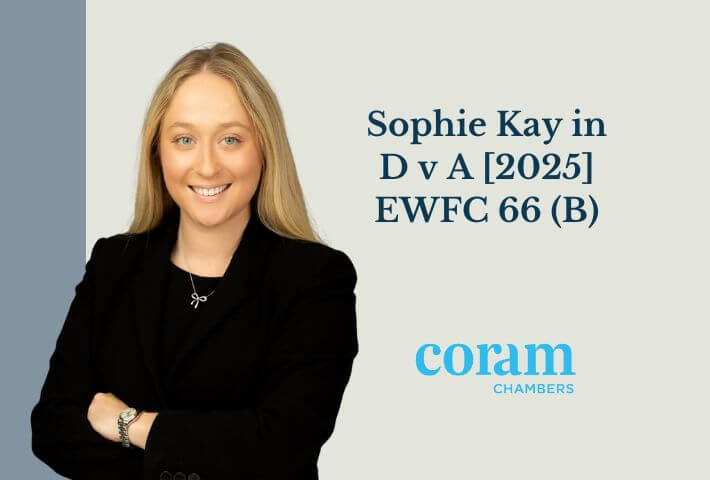I joined Coram in October 2019 and commenced tenancy in October 2020. Since then, I have been building a busy practice in all areas of chambers’ practice; this has included private and public children law, financial remedies following divorce (including third-party intervenor claims under TOLATA), injunctions under the Family Law Act 1996 and hearings in the Court of Protection. The breadth of knowledge within chambers is a real asset and people are always willing to share their experience and advice with more junior members. It is a great relief to know that other members of chambers are always willing to pick up the phone and speak to you about a case.
What follows is an example of a week during my second six, taking place during COVID-19. This was an unavoidably bizarre experience during pupillage, not least as I was just beginning to be on my feet in court. Typically, I work between 8.30am – 6.00pm, depending on the requirements of each case. Throughout pupillage and particularly during my first six I was encouraged to find my own routine and work out what suited me, with friendly guidance from other members of chambers and my clerks. Chambers is very supportive of its pupils, with members making the effort to introduce themselves and welcome me at chambers or, more recently, at a weekly virtual ‘Tea and Cakes’ on Zoom.
Monday
I spend the morning assisting my supervisor on a direct-access private children matter. The client had provided instructions and a draft statement. After reviewing the bundle to understand the context, I draft a response to allegations that the client had carried out serious domestic abuse. In the afternoon, I receive instructions to draft an opinion on whether an applicant who has changed their name by deed poll can issue proceedings using their former name to preserve their anonymity. After a quick call with the instructing solicitor, I spend the rest of the day researching this issue and preparing a first draft.
Tuesday
The morning is spent tidying up the opinion before sending it off. After a quick lunch, I check in with my clerk; whilst this is ostensibly to update my diary, I have not seen him for several weeks so we spend twenty minutes having a catch up. Later in the day, two members of chambers are kind enough to host a seminar on financial remedies for my co-pupil and me. Previous topics have included public and private children law, examination in chief, cross-examination and other, specific issues that we have asked to be covered. I walk away from the seminar with a handy reference sheet covering some common case management issues in financial remedy proceedings, together with guidance on the key cases and principles.
Wednesday
I have a quiet morning so use the time to research an article on the enforcement of child arrangement orders during COVID-19. This had been the subject of some lively debate during a Zoom seminar last week and it was clear that this was becoming an issue, notwithstanding the Government’s guidance. Just before lunch, I spend some time speaking to a solicitor on a pro-bono case, where I am representing a father who wishes to spend more time with child; since issuing the application, the client’s circumstances have changed significantly and I have to think carefully about whether any fresh professional evidence is required. At about 2.00pm my clerk calls me to say that a case has come into my diary for Thursday. I am representing a parent whose child has made allegations that they have been abused by their step-sibling during contact with the other parent. Another member of chambers had acted in the previous hearing so I call them whilst I wait for the papers to arrive. I spend the rest of the afternoon writing a position statement and draft order to send to the court.
Thursday
My hearing is at 10.30am. It is a telephone hearing so I have arranged to speak to my client at 9.00am to introduce myself and give her the opportunity to ask me any questions. She is understandably anxious so it is helpful to speak to her before we go into court. Whilst we are speaking, I receive a position statement from the other side and we use the time to discuss some additional issues that have been raised. I have a quick, but ultimately fruitless, phone call with my opponent to try to agree how the case should be managed. After the hearing, I finalise the order and send it to my opponent and the court. The rest of the day is spent drafting an attendance note for my solicitor.
Friday
Today I am being led in the High Court. I am following a senior member of chambers in an appeal dealing with a discrete point of law on the disclosure of evidence into parallel proceedings in a different jurisdiction. This is taking place remotely via video and it is slightly disconcerting being in the High Court from my kitchen table. I had spent some time compiling an e-bundle of authorities to assist the judge and was very relieved that it worked as planned. I keep a note for leading counsel and pass this onto the lay client and solicitor after I have reviewed it for typos.


